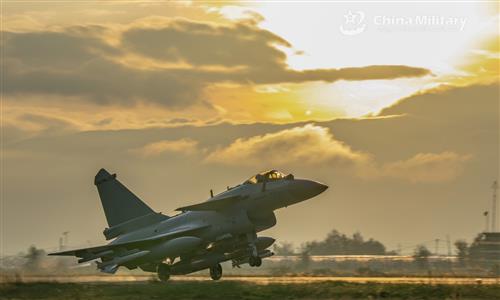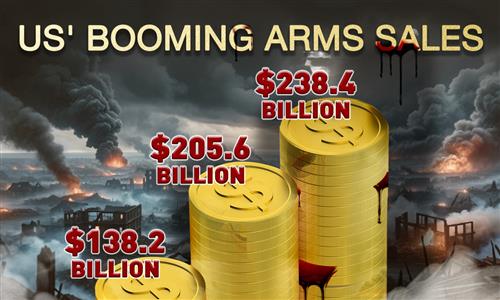US arms sales hit record high in FY2023 as diplomacy 'kidnapped by military-industrial complex'

Residents protest in Taipei with an American flag showing guns and dollars and a banner saying "Anti Proxy War" against US arms dealers entering the island of Taiwan, on May 3, 2023. Photo: VCG
US overseas arms sales surged 16 percent to a record $238 billion in Fiscal Year (FY) 2023, with rising demands due to major global military conflicts, according to a US State Department fact sheet released on Monday local time.
Chinese analyst said on Tuesday that the rising sales figures not only show the increasing geopolitical tensions incited by the US, but also outline an unfortunate fact that US diplomacy has been deeply kidnapped by the military-industrial complex.
According to the US State Department, in FY2023, the US Foreign Military Sales system directly negotiated $80.9 billion in sales, a 55.9 percent increase from FY2022. The remaining 157.5 billion were direct commercial sales (DCS), which represents a 2.5 percent increase compared to FY2022's figure.
The most noticeable sales included $12 billion worth of High Mobility Artillery Rocket Systems (HIMARS) to Poland, $8.5 billion worth of CH-47F Chinook Helicopters to Germany, and National Advanced Surface to Air Missile Systems (NASAMS) to Ukraine. The Czech Republic bought $5.6bn in F-35 jets and munitions.
Beyond Europe, the US also sold billions of dollars worth of weapons to allies in the Middle East and Asia-Pacific regions, according to their fact sheet. Big Asian deals included South Korea's $5.62 billion F-35 Aircraft order and $1.5 billion CH-47F Chinook order.
Behind the growth of arms sales, the US has created or intensified conflicts and crises in different regions of the world, forcing other countries to increase their budgets and buy US weapons to better serve the interests of the military-industrial complex, Li Haidong, a professor at the China Foreign Affairs University, told the Global Times on Tuesday.
While it remains uncertain as to whether the US would be drawn into a more protracted war in the Middle East with the spillover of the Gaza crisis expanding, US arms sales to Ukraine and its NATO allies will continue, since there is no end in sight to the Russia-Ukraine conflict. Meanwhile, the US is also advancing its "Indo-Pacific" strategy to contain China with its allies, fanning the flames in the Korean Peninsula, Taiwan Straits and South China Sea, according to analysts.
"Arms sales and transfers are important US foreign policy tools with potential long-term implications for regional and global security," the State Department said in a statement.
"US military sales abroad in FY2024 are likely to continue to grow," Li said, "the tendency of US policy serving the military-industrial complex will not change in the long run either."
It is indeed a great misfortune for the US that its foreign policy has been divorced from the needs of its own people and has been basically kidnapped by the military-industrial complex, the expert remarked.
Those sales, in Politico's view, indicate the Biden administration is "working to seize the moment in Europe and Asia to wean countries off Russian arms imports and increase domestic defense manufacturing."
Reuters stated that rising figures "underpin expectations of stronger sales for the likes of Lockheed Martin, General Dynamics and Northrop Grumman, whose shares are forecast to rise amid growing global instability."
Chinese military expert Song Zhongping told the Global Times on Tuesday that in essence, US arm sales serve US military hegemony, and that makes the US government the biggest arms dealer on Earth.
American politicians' constant hype of the "Russian threat" and the "China threat" is prompting the sales of weapons to win the support of American arms dealers in elections, Song said, adding that "there is almost no difference between the Democratic or Republican parties."




